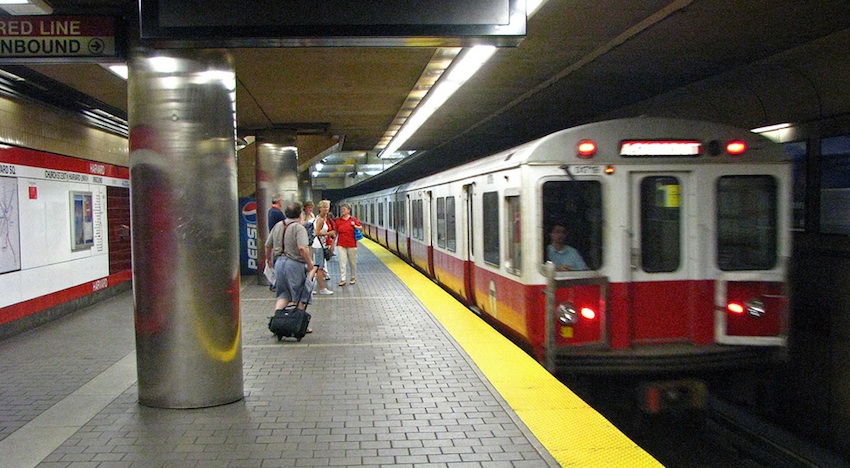MBTA Could Sell Naming Rights, Extend Hours Under Revised Transportation Bill

Photo via Flickr.com
Dunkin’ Donuts Station? The Staples Street stop? Under the latest version of a transportation bill being considered on Beacon Hill, these are some name changes MBTA riders could potentially see if the legislation is passed.
According to the language of a comprehensive transportation package that aims to put millions of dollars into the state’s overall system, including highways, bridges, regional transit authorities, and the MBTA, the T would be allowed to send out requests for proposals to potentially sell off the naming rights of stations and other properties in order to bring in additional revenue to support the agency.
In Section 75 of the lengthy joint transportation conference report, which was approved by both the House and Senate on Wednesday, the T would have to “issue a request for proposals to sell, license or rent naming or sponsorship rights for all subway, bus or commuter rail stations or other assets operated and owned by the authority,” no later than January 1, 2014. Once issued, if the MBTA enters into an agreement with a specific company, it would be up to T officials how long that name change would be in place.
This wouldn’t be the first time the MBTA has considered the business prospect, however. In March 2012, the transportation agency worked with a third-party company to develop a focus group consisting of riders and residents so they could develop a request for proposals. In July, they announced that the proposal would open 11 prominent stations up to eight-year corporate sponsorships, a move that could potentially bring in $18.4 million a year.
Beyond the naming rights, the MBTA would also be asked to run services after hours—something business groups and elected officials have been fighting for over the last few legislative sessions—if the current transportation bill is signed off by Governor Deval Patrick. The latest version of the bill states that the T would have to “issue a request for proposals from business, civic, and nonprofit entities to enter into sponsorship agreements for providing transportation services beyond the current hours of operation.”
Essentially, the T could call on outside agencies to help fund the extended nighttime service, allowing riders to catch a later train. The wording in the bill does not specify if the T would have to use buses or trains to extend service.
MBTA officials would not comment on the specifics of the legislation, but said that they were reviewing the bill. “The MBTA is considering some potential opportunities,” said T Spokesman Joe Pesaturo, in an email.
Senate President Therese Murray and House Speaker Robert DeLeo, who have both backed the latest version of the reform, which calls for $500 million in new taxes to offset the T’s deficit in the next fiscal year, while also fixing state roads and other transportation infrastructure, issued a joint statement on Wednesday calling for the passage of the bill. “This compromise legislation represents a responsible and efficient use of revenues that will solve the current transportation funding gap,” the statement read. “This bill will also initiate economic growth and support necessary infrastructure projects in the Commonwealth. It does not offer a blank check to the Department of Transportation or the MBTA but instead holds the two agencies accountable for their own fiscal management and commitment to reform.”
Besides the benefits of increased revenue for the MBTA, through sponsorships and station naming-right sales, officials said the legislation builds a “solid foundation” for state transportation needs and serves as an important step for long-term improvements. While the legislature approved of the funding bill, Patrick said late Wednesday night that he would not sign the proposal it in its current form, citing a lack of adequate funding, but that doesn’t mean the details and provisions laid out for the T would be eliminated from the package.

